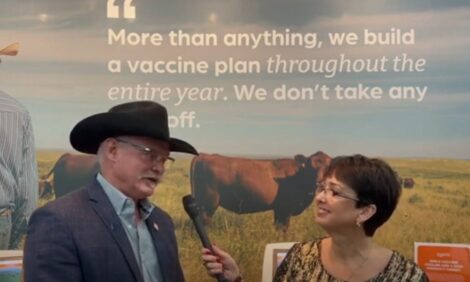



Living under the Shadow of Pesticides and Antibiotics
ANALYSIS - In the livestock sectors there has been great concern recently over the use of antibiotics both as therapeutic measures and also as growth promoters, writes Chris Harris.The concerns arise out of the fears over a build-up of antibiotic resistance in humans to a number of pathogens being passed on through residues of the antibiotics in meat, fish, eggs and dairy produce.
In the EU, the use of antibiotics as growth promoters has long been banned but in other countries it is still common practice.
In the US, where antibiotics are used for therapeutic measures, precautionary measures and as growth promoters, the Food and Drug Administration has taken the first steps to control their use.
The FDA has announced that it is taking three steps to protect public health and promote the judicious use of medically important antibiotics in food-producing animals. A voluntary initiative for labelling and use of antimicrobial drugs in livestock is proposed.
Based on a consideration of relevant reports and scientific data, FDA is proposing a voluntary initiative to phase in certain changes to how medically important antimicrobial drugs are labelled and used in food-producing animals. FDA is taking this action to help preserve the effectiveness of medically important antimicrobials for treating disease in humans.
This is a small step down the road to getting a firm grip on the irresponsible use of antibiotics and telling consumers on a label which antibiotics have been used in rearing animals might not appear to be a certain method for reducing antibiotic resistance. It could mean consumers will boycott such products but it is more likely that consumers will not fully understand what is written on the label. It appears a recipe for either hysteria and panic or just complaisance and ignorance.
However, while antibiotics in livestock might be causing some concerns among legislators and the industry, the use of pesticides on crops is also raising concerns.
In Europe, several countries have called a halt to the use of neonicotinoids because of two reports that have linked their use to the decline in honey bees.
The European Food Safety Authority is currently monitoring the situation through scientific projects related to bee health principally related to the use of pesticides, animal and plant health and the use of genetically modified organisms.
While pesticides may be a contributing factor to the decline in honey bees that are essential to crops health and pollination, of greater concern is the revelation that there are more than 200,000 tonnes of obsolete pesticides - nearly half the world's stockpile - is 12 former Soviet Union states.
According to the Food and Agriculture Organisation of the United Nations the stockpiles are being kept on tens of thousands of unprotected sites and they "pose a serious threat to the health of the people around them and to the environment".
Over the next four years, the EU and FAO are to invest €7 million to help these countries - Armenia, Azerbaijan, Belarus, Georgia, Kazakhstan, Kyrgyzstan, Moldova, the Russian Federation, Tajikistan, Turkmenistan, Ukraine, Uzbekistan - manage these obsolete pesticides and reduce the risks of current stocks.
At the same time, the EU and FAO are to build capacity to reduce risks from pesticides used in agriculture and avoid build-up of additional stockpiles in future.
The stockpiles have been built up because of the intensification of agriculture in the region over the years and now the FAO and EU have been alerted to the danger.
"Pesticides may be an important input for farming, but they need to be used responsibly while protecting human health and the environment from their adverse effects. In our quest for sustainability and to meet the challenge of feeding a growing population while preserving our environment, we also need to take a good look at the different options we have to protect crops and improve productivity. This includes using natural means to protect and improve crop yields through sustainable crop intensification, or 'save and grow' techniques as we call it at FAO," said José Graziano da Silva, Director-General of FAO.



